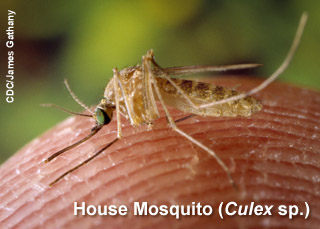
|
|||
|
|

Health Care Provider Information Surveillance  (En Español) - PDF  (En Español) - PDF |
|

West Nile virus emerged in the United States in the New York metropolitan area in the fall of 1999. Since then, the virus, which can be transmitted to humans by the bite of an infected mosquito, has quickly spread across the country. In Illinois, West Nile virus was first identified in September 2001 when laboratory tests confirmed its presence in two dead crows found in the Chicago area. The following year, the state's first human cases and deaths from West Nile disease were recorded and all but two of the state's 102 counties eventually reported a positive human, bird, mosquito or horse. By the end of 2002, Illinois had counted more human cases (884) and deaths (67) than any other state in the United States. The Illinois Department of Public Health (IDPH) maintains a sophisticated disease surveillance system to monitor animals and insects that can potentially carry the virus: dead crows, robins, blue jays, mosquitoes and horses. Mosquitoes can either carry the virus or get it by feeding on infected birds. The surveillance system also includes infectious disease physicians, hospital laboratory directors and infection control practitioners, local health departments and staff from IDPH's laboratory, environmental health and infectious diseases divisions who test for and report suspect or confirmed cases of various diseases that can be caused by mosquito-borne viruses. Mild cases of West Nile infections may cause a slight fever or headache. More severe infections are marked by a rapid onset of a high fever with head and body aches, disorientation, tremors, convulsions and, in the most severe cases, paralysis or death. Usually symptoms occur from three to 14 days after the bite of an infected mosquito. Persons at the highest risk for serious illness are those 50 years of age or older. The best way to prevent West Nile encephalitis and other mosquito-borne illnesses is to reduce the number of mosquitoes around your home and neighborhood and to take personal precautions to avoid mosquito bites. To learn more about West Nile virus and other mosquito-borne diseases and about prevention methods, read the other materials available on the IDPH West Nile virus Web site or contact the Illinois Department of Public Health West Nile virus information hotline at 866-369-9710, Monday - Friday, 8 a.m. - 5 p.m. |